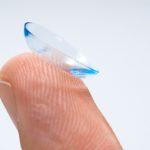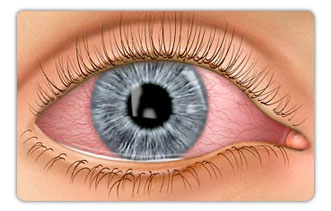Many people associate tears with crying caused from many different emotions. For example, some will cry in sadness, mourning a loss, or because of a strong pain, while others may cry in excitement, winning a grand prize, or finally seeing someone that had been gone for years. Nonetheless, these associations are correct but the thing is that there is more to tears than just these emotions.
 Tears actually play a big role on the overall health of the eyes. Every time the action of blinking occurs, a thin layer of tears is distributed evenly to keep the eyes lubricated. Without this natural lubrication, people begin to suffer from Dry Eye, a very common condition when there is insufficient lubrication and nourishment to the eyes. When the production of tears becomes excessive, the tears are able to drain out from the back of the nose through drainage ducts near the inner corner of the eyes.
Tears actually play a big role on the overall health of the eyes. Every time the action of blinking occurs, a thin layer of tears is distributed evenly to keep the eyes lubricated. Without this natural lubrication, people begin to suffer from Dry Eye, a very common condition when there is insufficient lubrication and nourishment to the eyes. When the production of tears becomes excessive, the tears are able to drain out from the back of the nose through drainage ducts near the inner corner of the eyes.
Other natural benefits of tears include:
- Helps to keep our vision clear
- Helps to protect against irritation
- Helps to reduce the risk of eye infections
- Helps to cleanse the eyes by washing away any foreign substance that may have fallen in the eye
 As mentioned above, Dry Eye occurs when there is a lack of lubrication and many things can cause this to develop. Some of these factors include age, gender, medications, medical and/or environment conditions. Even long term use of contacts can increase the chances of dry eyes. There are even studies that show a link between eye surgeries, such as LASIK, and the development of dry eyes. As of now, millions of people suffer from Dry Eye Disease (DED) or a form of it. In fact, this is one of the most common reasons for why patients come into the office.
As mentioned above, Dry Eye occurs when there is a lack of lubrication and many things can cause this to develop. Some of these factors include age, gender, medications, medical and/or environment conditions. Even long term use of contacts can increase the chances of dry eyes. There are even studies that show a link between eye surgeries, such as LASIK, and the development of dry eyes. As of now, millions of people suffer from Dry Eye Disease (DED) or a form of it. In fact, this is one of the most common reasons for why patients come into the office.
So, how do our patients find out if they are suffering from DED?
It all starts with a visit to the clinic to receive a comprehensive eye exam. This eye exam will carefully evaluate the patient’s eyelids, cornea, medical history, and the quality/quantity of tears that is being produced (American Optometric Association, 2014). This evaluation is then analyzed by the optometrist, who will be able to look at the information and is then able to determine if the patient is suffering from Dry Eyes.
What is the treatment for DED?
Once diagnosed with DED or a form of Dry Eyes, a few things may occur. The treatment for this is to keep the eyes healthy by applying artificial tear solutions for those who suffer from a mild case. If the Dry Eyes are a chronic condition, then an optometrist will prescribe eye drops or ointments that help to decrease any inflammation that is present. Other treatments are to help the patient conserve their tears with the help of a plug. This is done by blocking the patients tear ducts, which are used to drain any excess tears down the back of the nose, with a silicone or gel-like plugs (American Optometric Association, 2014). These plugs can be put in permanently or for a certain period of time. Either way, the goal of this type of treatment is to keep the tears in the eyes as long as possible, to keep the eyes lubricated and to help reduce any problems that are caused from Dry Eyes.
 The tears that our eyes produce are very beneficial to us and without them the health of our eyes begins to worsen. Especially in today’s world where many people either work in front of bright computer screens or children who grow up playing video games all day long, these can increase our chances of developing dry eyes. It is important to take care of our eyes just like we would take care of any other part of our body. Without healthy eyes, our vision begins to pay the price. Do not let this happen to you!
The tears that our eyes produce are very beneficial to us and without them the health of our eyes begins to worsen. Especially in today’s world where many people either work in front of bright computer screens or children who grow up playing video games all day long, these can increase our chances of developing dry eyes. It is important to take care of our eyes just like we would take care of any other part of our body. Without healthy eyes, our vision begins to pay the price. Do not let this happen to you!
There are a few things that we all can do to help keep our eyes in good health:
- Blink Regularly – especially when looking at a screen for long periods of time.
- Wear Sunglasses – just like you would apply sunblock; block the sunrays from your eyes by using sunglasses.
- Drink lots of water – do not become dehydrated, make sure to drink the recommended 8 to 10 glasses of water each day. Drinking plenty of water benefits all of the body.
Do you believe you are suffering from DED or a form of Dry Eyes? Give Eye Physicians of North Houston a call at (281) 893-1760 or visit our website to learn more about our Dry Eyes!
Works Sited
American Optometric Association. (2014, 09 04). Dry Eye. Retrieved from American Optometric Association: http://www.aoa.org/patients-and-public/eye-and-vision-problems/glossary-of-eye-and-vision-conditions/dry-eye?sso=y

